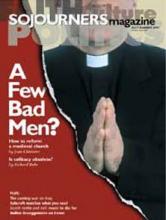Novels can lead us to a deeper and more experiential knowledge of our faith, says author David Cunningham in Reading is Believing: The Christian Faith through Literature and Film. In his book, he draws on one novel or film to illuminate each article of the Apostle's Creed. Here he uses Toni Morrison's Pulitzer-Prize winning book Beloved to illustrate "He will come again, to judge the living and the dead."
Our beliefs about the future are tied to how we live in the present, but such beliefs are also related to a certain kind of attitude toward the past. In the Christian context, our belief that "Christ will come again" is a way of reminding ourselves that Christ's first coming was of urgent importance—and thus, that we are called to remember and to live into the life, death, and resurrection of Jesus until he comes again. We spur ourselves to remember the past by thinking about the future, and we spur ourselves to think about the future by remembering the past....
Beloved is a book about our memories of the past, about the shape of our lives in the present, and about our expectations for the future. Its title character [Sethe] is someone who "comes again," in judgment and in love—and the book explores what it means for others to live into that second coming in a faithful way....
The book is filled with biblical allusions—from the party at Sethe's house that turns into a scene of the feeding of the multitudes, to the "tree" on Sethe's back (imprinted by the slavemaster's lash) that recalls the crucifixion, to the book's deeply meaningful epigram, from Paul's letter to the Romans: "I will call them my people, which were not my people, and her beloved, which was not beloved." The characters obviously have deep lives of prayer, and live into their relationship to God with seriousness and with joy...
Read the Full Article
